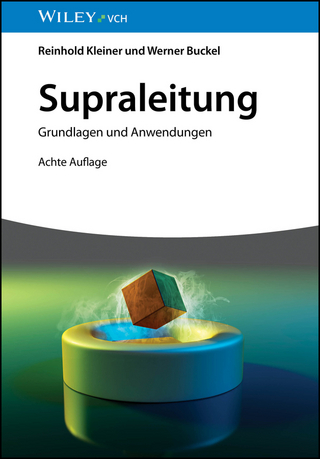
Magnetic Microhydrodynamics
Springer International Publishing (Verlag)
9783031583759 (ISBN)
This open access book presents the most recent advances in the novel, interdisciplinary field of magnetic microhydrodynamics. This emerging area of advanced research combines magnetism with the knowledge of bioinspired local flow control to create novel concepts and technological solutions that could revolutionize the field of microfluidics. Edited and authored by world-recognized leaders in this field, this book covers how the action of magnetic forces on soft matter can result in a richness of possible static and dynamic behavior. The contributions featured in this book introduce timely examples of novel concepts (new fluids and control), processes at interfaces (local probes, electrochemistry), and applications of magnetic soft matter in cell biology, cargo transport, and energy. This book is of great interest to scientists from various backgrounds looking to explore, learn of recent developments, and take part in laying the foundations of an entirely new and dynamic field of research.
Bernard Doudin completed his Ph.D. at University of Lausanne, in 1991, in Switzerland, with postdocs in Cambridge (UK) and EPFL (CH). He took an Assistant Professor position in the USA (University of Nebraska) in 1997, tenured in 2002, and joined the University of Strasbourg as Professor in September 2005. He has received numerous awards including Ph.D. prize of the University of Lausanne (top 2%); NSF Career grant (1998), Chaired Professor of the French Ministry (2005); Fellow of the University of Strasbourg International Studies (2014); Fellow of the Institut Universitaire de France (Senior, 2021).
His area of expertise is the fabrication of nanoscale devices taking advantage of the spin degree of freedom. He pioneered original systems and concepts in the field of spintronics, evolving towards multi-stimuli devices, at the frontier between physics, materials science and chemistry. He is interested in interdisciplinary applications of these concepts, in molecularor organic electronics, nanofluidics, and (electro)chemistry.
Michael Coey completed his Ph.D. on Magnetic Oxides at University of Manitoba, Canada in1971. He has a Diplôme d'Habilitation from the INP- Grenoble, France (1986) and a Sc.D. on Magnetic and Electric Properties of Iron Minerals from the University of Dublin (Trinity College Dublin) Ireland (1987), where he was Erasmus Smith's Professor of Natural and Experimental Philosophy (founded 1724) from 2007 to 2012 and is currently Professor Emeritus, Academic recognition includes Membership of Royal Irish Academy, Fellowship of the Royal Society, Overseas membership of the US Academy of Sciences and membership of the European Academy of Sciences. Awards include the Gold Medal of the Royal Irish Academy, 2005, Albert Einstein Professorship of the Chinese Academy of Sciences, 2010, Humboldt Prize 2013, Gutenberg Prize and professorship of the University of Strasbourg 2015 andMax Born prize and medal 2019. His research interests in magnetism span magnetic, electronic, and structural properties of solids, spin electronics, amorphous materials, permanent magnetism, physical properties of minerals, magnetoelectrochemistry, and effects if magnetic fields on liquids.
Andrejs Cebers is Professor of University of Latvia and Head of the Department of Theoretical Physics and the Laboratory of Magnetic Soft Materials (MMML). He graduated from the Latvian State University. By the decision of the Mechanics Council 2 at the Lomonosov Moscow State University on December 10, 1976, he was awarded the academic degree of Cand. Sci. in Physics and Mathematics. By the decision of the Supreme Qualifying Committee of the Council of Ministers of the USSR of April 15, 1988, he was awarded the academic degree of Dr. Sci. in Physics and Mathematics. He has received a number of awards including Corresponding Member Academia of Sciences of Latvia (1992), Full Member of Academia of Sciences of Latvia (1993), Full Member of Europaea Academia (2005), and Chevalier d'ordre des Palmes Academiques du gouvernement de France (2021). His area of expertise is the magnetic soft matter.
Emergent colloidal currents generated via exchange dynamics in a broken dimer state.- Magnetic nano- and microactuators for fluid control.- Emergent Colloidal Currents Generated via Exchange Dynamics in a Broken Dimer State.- Orientation Behavior of Anisometric Magnetic Nanoparticles in Dynamic Magnetic Fields.- Imaging locally driven flows.- Molecular approach of paramagnetic liquids and interfaces.- Development of numerical methods for simulation of intricate interface patterns of magnetic soft materials.- Miniaturisation: towards 1 mim frictionless microfluidic channels.- Elucidating flow profiles in magnetically stabilized liquid tubes.- Spin-dependent charge transfer at Electrodes.- Magnetic separation of rare-earth ions.
| Erscheinungsdatum | 04.04.2024 |
|---|---|
| Reihe/Serie | Topics in Applied Physics |
| Zusatzinfo | XVIII, 215 p. 79 illus., 76 illus. in color. |
| Verlagsort | Cham |
| Sprache | englisch |
| Maße | 155 x 235 mm |
| Themenwelt | Naturwissenschaften ► Physik / Astronomie ► Atom- / Kern- / Molekularphysik |
| Naturwissenschaften ► Physik / Astronomie ► Elektrodynamik | |
| Schlagworte | Cytoskeletal Filaments • Exchange Dynamics • Magnetically Actuated Artificial Cilia • Magnetically-Actuated Membranes • Magnetic Flow Control • Magnetic Nano- and Microactuators • Magnetic Nanoparticles • magnetic separation • Magnetic Soft Matter • Magnetism in Life Science • Magnetochemistry • Magnetohydrodynamics • Magnetolithography • Magnetophoresis • open access |
| ISBN-13 | 9783031583759 / 9783031583759 |
| Zustand | Neuware |
| Informationen gemäß Produktsicherheitsverordnung (GPSR) | |
| Haben Sie eine Frage zum Produkt? |
aus dem Bereich


